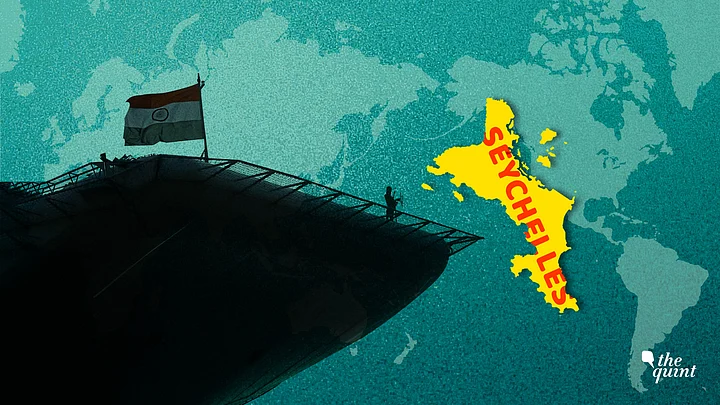The President of Seychelles, Danny Faure, is currently on a state visit to India, marking his first official bilateral visit to the country. The six-day trip has grabbed attention largely because it comes on the heels of growing uncertainty about the Indian naval base in Assumption Island.
Too caught up to read? Listen to it instead.
This state visit marks the beginning of New Delhi and Victoria’s joint effort in strengthening their overall relationship with a focus on security and defence cooperation.
The two countries signed six Memorandums of Understanding (MoUs), including Indian assistance for implementation of small development projects, cooperation in cyber security, technical agreement on sharing white shipping information, etc. The focus on security in the list of MoUs and other offerings is apparent. The key word in this regard is capacity-building.
The Curious Case of Assumption Island
With Faure’s state visit to India, the spotlight continues to be on Assumption Island. India and Seychelles’ agreement about a naval facility in the Assumption Island was originally signed in March 2015. The deal included details about the development and management of facilities on Assumption Island alongside personnel training.
Funded by India and owned by Seychelles, the project is set to be jointly managed by both the countries. Assumption Island’s proximity to the Mozambique Channel makes it increasingly crucial for India’s outreach in the Indian Ocean Region (IOR). It is worth noting that India’s maritime security strategy of 2015 added the Mozambique Channel in the primary areas of maritime interest, which was missing in the previous maritime military strategy of 2007.
Since 2015, the deal has experienced numerous roadblocks. After the secret document was leaked online – leading to domestic opposition and concerns about the nature of the project – the agreement was revised and signed again in January 2018.
The core issue with the agreement is its ratification by the National Assembly of Seychelles (the Parliament). In Seychelles, for an agreement to come into force, it has to be ratified by the National Assembly. Given the lack of numbers of the ruling party in the Parliament, President Faure decided against presenting the India-Seychelles agreement for ratification. Notably, the members of opposition coalition have reiterated their opposition to the deal.
A few days prior to President Faure’s trip, the local media had been told that the issue of Assumption Island would not be discussed with PM Modi during this visit. But on the contrary, the stalled project was discussed – but no crucial details were made public. After the discussion, President Faure said that the two parties are “equally engaged and will continue to work together bearing each other's interests in mind.” PM Modi expressed similar sentiments.
The responses of the state leaders offer little indication on how the project will materialise in the absence of its ratification by Seychelles’ National Assembly. That the agreement has not been submitted for ratification implies that it has not been officially rejected, but nor has it been given the go-ahead.
The situation however, is not all gloomy. The statements of the heads of states indicate that New Delhi and Victoria are willing to exercise greater patience when it comes to their agreement on Assumption Island.
India and Seychelles: Fortifying the Bond
Within the last decade, India has been investing its diplomatic energies and funds in enhancing military cooperation with the IOR and Southeast Asian littorals. New Delhi has been enthusiastically on the lookout for strategic assets aboard. Military bases, more so in the IOR, would help India bolster its power projection capabilities and consolidate its hold at a time when China is expanding its military presence in the region.
India’s relationship with IOR littorals has gained greater urgency due to reasons that include:
- China’s overseas military base in Djibouti,
- take-over of the Hambantota port (Sri Lanka) for 99 years,
- Beijing’s partnership with Maldives at the expense of New Delhi’s concerns
During PM Modi’s visits to IOR littorals in 2015, New Delhi signed agreements with Seychelles and Mauritius to develop infrastructural facilities in Assumption Island and Agalega Island, respectively. Overall, these projects will bolster the littoral’s security capacities and offer India a strategic foothold in the IOR. This will help strengthen India’s position vis-a-vis China’s growing influence in the region.
New Delhi and Victoria have traditionally had healthy bilateral relations, which have strengthened over the years. India has been an important defence partner for Seychelles, characterised by Indian supplies of defence equipment, military exercises, etc. The Indian Navy has periodically undertaken patrolling of Seychelles’ Exclusive Economic Zone (EEZ) at the request of their government.
The current bilateral visit reflects India’s desire to solidify security relations with Seychelles and augment its defence capacities.
Continuing its recent practice of providing Line of Credit (LoC) for facilitating deeper defence cooperation, New Delhi offered a 100 million dollars to Seychelles. The LoC will allow Victoria to acquire defence assets and equipment from India to enhance its defence capabilities and capacities to monitor and protect Seychelles’ 1.3 million square km EEZ. In the same vein, New Delhi also handed over a second Dornier aircraft to President Faure to augment Seychelles’ maritime surveillance capability.
While New Delhi hopes for favourable political conditions in Seychelles for the ratification of the agreement on Assumption Island, both countries will continue to engage with each other in other areas of maritime security.
(The author is a PhD Candidate at the Graduate School of Politics (GraSP), University of Münster, Germany. Her doctoral thesis concentrates on the evolution of India’s security role in Southeast and East Asia. She can be reached at @aditi_malhotra_. This is an opinion piece and the views expressed above are the author’s own. The Quint neither endorses nor is responsible for them.)
(At The Quint, we question everything. Play an active role in shaping our journalism by becoming a member today.)
